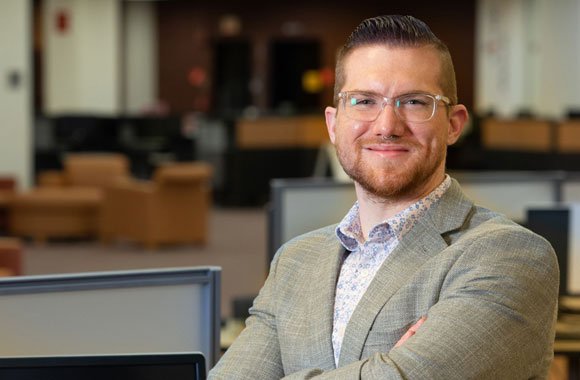Alumnus Named Lovejoy Library’s First Online Learning Librarian

The function of libraries continues to improve, steering more towards digitalization and the changing times, but the last year has seen a catapulting need and desire for online learning because of the unexpected and unwelcome fallout from the pandemic.
In an effort to better provide patrons with cutting-edge advancements and in response to digital expectations, SIUE’s Lovejoy Library hired Mitchell Haas, assistant professor in Library and Information Services (LIS), as its first online learning librarian.
“I am responsible for the creation, implementation, and assessment of best practices and guidelines for online learning object creation,” said Haas, who earned a bachelor’s in history in 2010 from SIUE. “This includes determining the appropriate application of tenets of instructional design and accessibility best practices.”
Haas has completed several asynchronous activities since he started in January. He and Elizabeth Kamper, LIS information literacy librarian, created a source evaluation activity using the ACT UP method which incorporates a social justice focus by asking students to critically think and consider privilege and bias when contemplating sources for their research assignments.
“This activity shows that access to information and publication is not an equitable playing field,” noted Haas, “and that scholarship created by people whose voices have traditionally been marginalized within the confines of academic publishing, can be found outside of it in such places as open access journals, books, blogs, etc.”
“I feel very passionate about using methods like ACT UP to uplift voices that are all too often left outside of the sphere of scholarly publishing,” he added.
Recently, Haas completed his first interactive tutorial with the help of LIS Interim Assistant Dean and Health Sciences Librarian Juliet Gray.
“Using a tool called Rise 360 and content we designed collaboratively, I was able to create a tutorial on evidence-based medical research that supplements much of what would normally be taught in a face-to-face instruction session into an online learning object,” Haas shared.
“I find both of these projects to be integral to the future of my work at SIUE, because they will help set standards for other asynchronous instruction activities and online learning objects that I’ll be creating,” he continued. “Additionally, by incorporating new technology and ways of thinking about information and information privilege, it will help ensure that complacency does not take root when information literacy, search strategies, and more are taught regardless if these topics are done so online in an asynchronous format, synchronously online or in-person.”
Being able to offer a variety of modules for student learning is critical, according to Haas. “Since the pandemic began more than a year ago, so much of our lives has been forced into an online environment,” he said. “This, in spite of vaccines and other such improvements, is not going to change anytime soon. Having an online learning librarian at Lovejoy Library ensures that every aspect of our information literacy instruction can be efficiently translated to students regardless of the mode of classroom in which it is presented.”











